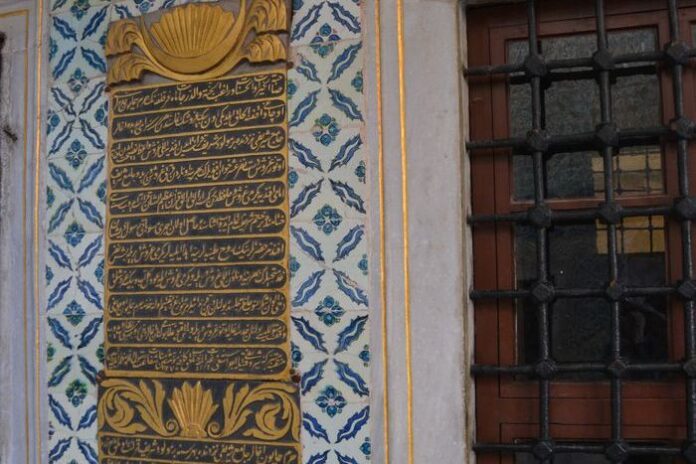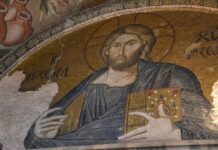Instead, this session was an attempt to move the discussion forward without histrionics and public posturing, and one must give Justinian full credit for making a remarkable effort. They met at the palace of Hormisdas—not quite part of the grand palace in Constantinople, but for discretion and privacy a good choice, for it lay down the hill behind the circus and toward the water. It offered a discreet semiofficial location for conversations away from the public eye—which would have gazed intently on a meeting held in one of the magnificent churches of the city or in the palace proper. The location may have put the conversation under the particular eye of Theodora. (The empress had a reputation for being the court’s friend to one-nature Christians and she seems to have played a careful game, keeping doors open without breaking with her husband’s brand of religion.)
In the dialogue, the Chalcedonians were strong on two points: Chalcedon itself, and the support the Roman church gave to it. The latter bears the real mark of Justinian’s policy, because he was already meditating the invasion of Africa the next year and the eventual restoration of the western, Roman world to his domains. To unify his political empire, he could not afford a division of his ecclesiastical empire. He overestimated himself.
Ibas and Theodoret
The Syrians, on the other hand, were interested only in promoting good doctrine and condemning bad teachers. Ibas of Edessa and Theodoret, teachers of the fifth century whom the monophysites thought had wrongly escaped condemnation, were the objects of their attention. Ibas was a relatively minor figure, but the awkwardness lay in the fact that he had quoted the supremely eminent and revered Cyril of Alexandria, the leading light of that generation, in ways that were incompatible with Chalcedon. The critics of Ibas did not condemn the author but claimed instead that he hadn’t written the letter in question at all. By that evasion, they could avoid dealing with the quotations from Cyrus and could pretend that these were also inauthentic. In the arguments that followed, the defenders of Ibas had the simpler position of asserting that he was ortho-dox and that the text was authentic. Justinian never found peace with the Syrians, but twenty years later he promoted the condemnation of Ibas and Theodoret and their senior and more theologically sophisticated colleague Theodore of Mopsuestia at a great global church council, in the hope that such condemnation (which we will see backfire) would encourage the one- nature Christians to support him.
On the first evening and again on the morning of the second day of the meetings, the Chalcedonian bishops saw Justinian on their own. Then on the third day, they sent for the Syrians, who joined their clerical colleagues and the emperor. Justinian tried for compromise: “I don’t think you are actually unorthodox, but you have scruples over detail that make you want to avoid communion with us, and you are indignant at the presence of certain names on the official diptychs” (the lists of former orthodox bishops). Justinian suggested that the Severans get out and about and visit Rome and Alexandria to see how much agreement there was in the world, but they demurred. He pushed on with this proposal for a compromise:
Would the following conditions perhaps be acceptable to them: they might anathematize Diodorus, Theodore, Theodoret, Ibas, Nestorius and Eutyches, and accept the Twelve Chapters of the holy Cyril, while anathematizing what had been written against them; they might confess one nature of God the Word incarnate, but they should refrain from anathematizing those who speak of two natures after the inexpressible union, anathematizing instead those who hold Nestorian views and divide up Christ into two natures, while confessing, as a crafty device which they had discovered long ago, together with the other side “the two united and inseparable natures”; they should accept the synod of Chalcedon as far as the expulsion of Eutyches was concerned, but they need not accept the definition of the faith made there; they should cease anathematizing the Tome of Leo; and the li- belli of the Romaioi should not be suspended istanbul tours.
Constantinople two decades
This anticipates Justinian’s prescription for the council that he would hold at Constantinople two decades later: sacrifice the reputation of named individuals left and right as a way to agreement. To a connoisseur of the debates of these decades, this is an ingenious, thoughtful, and possible compromise. But it didn’t work in 532. And it didn’t work two decades later, either Born in Sozopolis.
In the absence of such compromise, Justinian the stubborn amateur theologian was willing to insist on unity. This is the moment at which a Christian emperor can first be seen using his authority effectively, consistently, and deliberately to bring all his followers into one religious tent. The natural effect of such employment of authoritarian power is to encourage and promote disagreement, and that is what happened.








